The nature of daily legal practice has evolved in the age of coronavirus, and so, too, must lawyers’ approaches to networking, says Cassandra Heilbronn.

Ms Heilbronn – a former president of Women Lawyers Association Queensland and the sports legal manager for a government authority in the Middle East – spent substantial time, as a sports lawyer, attending corporate boxes, chairman’s lounges, awards evenings and even prematch coin tosses, all of which presented opportunities for professional networking.
Speaking recently on The Corporate Counsel Show, Ms Heilbronn said that, in a post-pandemic marketplace in which workforces are more scattered and attendance at major events will be restricted, at least for the foreseeable future, lawyers can revert to “the old school ways” of networking.
“My number one source for that are the lists,” she said, referring to listicles of top business people and rising stars that media publications often produce. “You look at the lists with 20 names, you can read a brief summary of them, what they like to do as a person, and you use those to start identifying who could be your potential clients.”
“Because we have LinkedIn, you can look to engage with them. Sometimes, Twitter is easier as a first step than LinkedIn, but I’m excited to see lawyers go back to thinking how our counterparts used to in the 1980s and 1990s with print media – although I appreciate it it’s accessible online now – and using that as an opportunity to network,” she said.
“I also think it’s a really good time to work out where you need to focus your investments of time in different people, even if it’s just sending a quick WhatsApp or an email just to touch base with them, they will always remember you. So, if you need to call on them, particularly as an in-house lawyer, you do need to call on favours or phone a friend.
“If you’re keeping up those relationships in the different professions, it will help you later on. I’m excited to, almost like a back to the future type situation, post-pandemic, whenever that will start.”
Lawyers should be wary of being overfriendly on social media platforms such as Instagram, she added, even though more and more professionals are using that photo-sharing app to bolster their firm and business branding.
“We already have a professional website on LinkedIn. But, second to that, we have Twitter. When I add people on LinkedIn, I will try and put a personal message so they can remember where they met you. But people are using that barcode feature now on LinkedIn. To be honest, I didn’t think that was going to take off, but it is,” she warned.
“I don’t think anyone uses Facebook anymore, so I would definitely stay off of that – unless it was a fellow junior lawyer, you’re both at an after five networking drinks and you’re taking selfies and you’re like, ‘Hey, let’s add each other on Instagram’, that’s a good way to build a relationship, but certainly not amongst senior people.”
When asked to what extent lawyers should be prioritising networking and broader vocational prospects, against the backdrop of the pandemic and subsequent economic downturn, Ms Heilbronn said, “you should never stop networking”.
“The time you should be marketing is when you don’t need to market. So, when you are really busy and you do have a lot of work on, that is when you should be focusing on it,” she advised.
“I have what I call a six-by-six…I’ve got my A-list and B-list. The A list is people I already have that relationship with; they might’ve briefed me or I might’ve briefed them. The B-list is the potentials. In my six-by-six, I make sure I have six points of contact over the course of six weeks amongst them. It might be sending a case, seeing a tweet they’d put out about a new sponsorship deal.
“When I was a second-year lawyer, I would spend time every day entering into this spreadsheet of my six-by-six contact. It’s a lot easier now, because it’s ingrained in my way of life. But I say that lawyers should be concentrating on it. It doesn’t need to be the sole focus, but we don’t want any lawyers turning around and saying, ‘Oh, hang on. I’ve just spent the last six months and I haven’t reached out to anyone’, because that certainly doesn’t help the mental clarity with progressing a new relationship. So, we can pick it up at any time and no one will know.”
Regardless of the environmental circumstances, however, one thing that lawyers cannot lose sight of, Ms Heilbronn insisted, is that networking is ultimately about building relationships rather than being transactional.
“You’re not pitching. If you start pitching, that’s when you’ll lose the other person. It’s about having a professional relationship moving forward, in which that person trusts you. If you’re genuine, things like friendship will come naturally,” she said.
In the same episode, Ms Heilbronn outlined a handful of simple, practical approaches to networking that lawyers can and will find success with.
To listen to the full conversation with Cassandra Heilbronn, click below:

Jerome Doraisamy is the managing editor of professional services (including Lawyers Weekly, HR Leader, Accountants Daily, and Accounting Times). He is also the author of The Wellness Doctrines book series, an admitted solicitor in New South Wales, and a board director of the Minds Count Foundation.
You can email Jerome at: